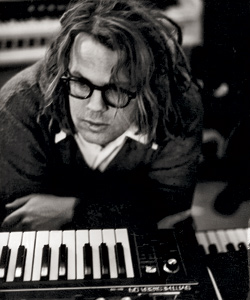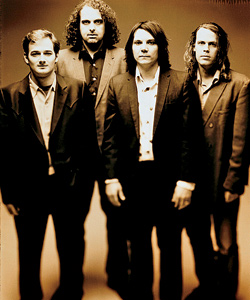|
|
When Edward Burch thinks of Jay Bennett, he remembers discussions about music that went all night. “I would ask a question like, ‘What is this crazy chord?’ and not only would he teach me how it was and why it was but he’d get into why the note changes its name,” says Burch, a collaborator on two albums. “He’d obsess over it in a way that showed he loved knowledge.”
In 2001 Bennett told me, “There’s a certain joy in exploring pure noise. . . . Just getting the instruments to do things they weren’t intended to do. The feedback, playing an eggbeater, playing an out-of-tune piano by banging on it.” His philosophy was that dissonance could “make the prettier parts of the songs sound prettier.”
That hyperfocused attention to detail led Bennett to become one of the chief creative forces behind Wilco—though by the 2002 release of the commercial breakthrough Yankee Hotel Foxtrot, he had been fired from the band. There was little mystery as to why: His clashes with frontman Jeff Tweedy were caught in I Am Trying to Break Your Heart, a documentary that friends say misrepresented Bennett. In August, Bennett’s contributions come back to light, as Warner Bros./Reprise rereleases three of Wilco’s early albums—A.M. (1995), Being There (1996), and Summerteeth (1999)—all of which bear his influence. (In early May of this year, Bennett filed a lawsuit against Tweedy seeking compensation he said was due him from his work on those recordings.)
The reissues arrive at a bittersweet moment: In late May, Bennett, 45, died in his sleep from an accidental overdose of pain medication. He was in need of hip replacement surgery and had reported on his MySpace page that he was suffering from “severe pain” in his right leg.
According to friends and former band members (Wilco would not comment for this story), Bennett’s contributions helped transition the group from its ragged folk and country roots to the multidimensional pop that gave them critical and commercial flight. “The great thing about the work that he did is that it’s there for others to hear forever,” says Ken Coomer, Wilco’s former drummer.
Photograph: Courtesy of the Bennett family
|
|
An audacious double album, Being There paid homage to past masters, from the Faces to The Replacements, thanks to Bennett’s cocksure guitar riffs on “Outtasite (Outta Mind)” and “Monday.” It was also the first Wilco album featuring keyboards; Bennett’s barroom piano on “(Was I) In Your Dreams” helped frame the album against the boozy fatalism of Tweedy’s lyrics. “We didn’t even know he played,” remembers Coomer. “At the beginning of [making] Being There, Jay walks over to the piano and starts playing and all of us did a head turn. Jay always came up with the passionate parts.”
During live performances, Bennett was known for his high kicks and dervish guitar solos. His wild attitude onstage was complemented by a growing interest in studio experimentation. He collected roomfuls of vintage amplifiers, organs, pianos, and every kind of bell and whistle imaginable. “He looked at [the gear] as tools; the more tools he had, the more he could do,” says Bob Andrews, Wilco’s former tour manager, who was in the studio during the recording of A.M. Upon leaving Wilco, Bennett trucked all the equipment to Champaign, where he opened Pieholden Studios. In the ensuing years he honed his signature sound recording five solo albums and playing for and producing other bands including Blues Traveler.
During his tenure in Wilco, Bennett emerged as Tweedy’s coconspirator in the band, creating orchestration that enhanced the melancholy of Tweedy’s songs. By Summerteeth, Wilco’s weird and wonderful pop tour de force that sent the band in a new direction, “he was the perfect foil for Jeff’s writing,” says Coomer. “He was willing to try things and experiment.”
Bennett’s vintage keyboards float throughout songs like “She’s a Jar” and “Pieholden Suite,” leaving a dreamy aftertaste. His presence provides a continual commentary on the melody at hand, whether from a spooky banjo clucking (“Via Chicago”) or an instrumental pile-on that builds to an emotional storm (“My Darling”).
Coomer says Bennett spent late nights attending to details that would have escaped the others but helped make Summerteeth one of Wilco’s finest efforts. “Jay did a lot of that on his own time. He was instrumental in making it the pop record that it is,” he says, adding, “He had a presence, he really did, without ever trying.”
Photograph: Brian Velenchenko/Corbis




